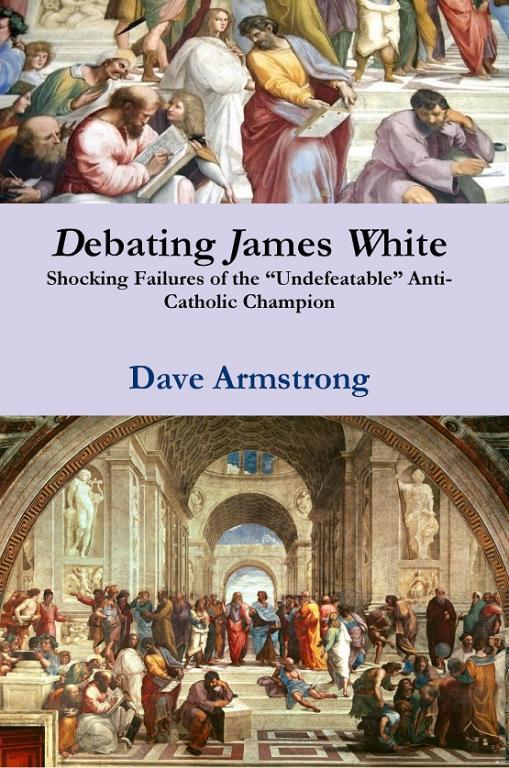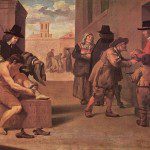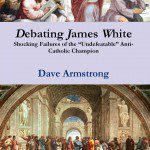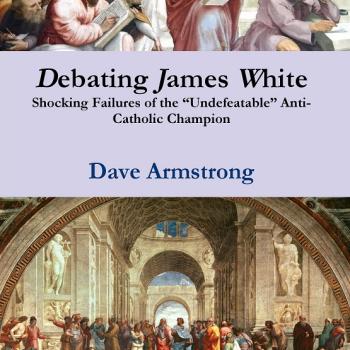(10-28-13)
***
An anti-Catholic– in scholarly usage – is not merely a person who differs with Catholicism. Nor does it refer to someone who “hates” Catholics or opposes all things Catholic simply because they are Catholic. And it doesn’t refer to emotions or opposition to individuals, but rather, to Catholic theology.
The anti-Catholic is one who thinks that Catholicism is not a Christian system of theology and that to be a good Christian and get saved, one must be a bad Catholic; that is, reject several tenets of Catholicism that differ with Protestantism; or in the case of Orthodox anti-Catholics, with Orthodoxy.
But first let me introduce the man who is the subject of this book. James White (b. 1962) is a Reformed Baptist apologist, author, public speaker and debater, and elder at his church. He does many other things in his apologetics besides oppose Catholic theology, and many of these are good and worthwhile endeavors; for example, his critiques of Islam (his recent emphasis), the King James Only viewpoint, theological liberalism, Mormonism, and atheism.
By and large, in dealing with these topics, he does a good job, in my opinion, and I have often publicly commended him for it. When it comes to Catholicism, on the other hand, it’s quite a different story. In that domain he falls into the typical (and rather outrageous) errors of anti-Catholic thought.
Mr. White is the founder and director of Alpha and Omega Ministries, which began in 1983. In 1990 he started concentrating on critiquing Catholicism, and produced his first two books on the topic: The Fatal Flaw, and Answers to Catholic Claims (both by Crowne Publications: 1990). His other books (out of 26) that are devoted wholly or largely to Catholicism, include The Roman Catholic Controversy (1996), Mary – Another Redeemer? (1998), The God Who Justifies (2001), and Scripture Alone (2004): all published by Bethany House.
White obtained an M.A. Degree in theology from Fuller Theological seminary in 1989. During the mid-90s as the Internet began to flourish, he began devoting a lot of time and energy to that medium, and he started his weekly webcast, The Dividing Line, in September 1998. It often deals with Catholicism. He developed a website and blog, with voluminous writings, as well.
He is probably most known (and renowned) for his formal oral debates. According to his website he has done 117 of these, starting in August 1990, including 38 devoted to various Catholic beliefs: or 32% of all his debates. He engaged in more than one debate with apologists such as Fr. Mitch Pacwa (five), Robert Fastiggi (four), Tim Staples (three), and Patrick Madrid (two).
White also has challenged me to oral debate on three occasions: 1995, 2001, and 2007. Thus, he averages a request every six years (even though – oddly enough – he constantly asserts that I am a profound imbecile and ignoramus in theological and exegetical matters), and is due to ask me again before this year is out. Perhaps this book will be the impetus.
My answer was the same in every instance: I regard oral debates as vastly inferior to written debate and I don’t cultivate public speaking, in any event. I note that White is also a writer, whereas I am a writer only, so that the written medium is where we could and should best interact: the common ground.
“Debating” in the title of this volume is especially apt, as it highlights how Mr. White views himself and how he – by all appearances – especially wants to be known. I love debate and dialogue, myself, as a longtime socratic and apologist. Christian apologists (defenders of the faith: in either its Protestant, Catholic, or Orthodox forms) certainly debate; if they don’t, they are surely not apologists worth their salt.
The question at hand, however, is how to define a debate, what one’s intentions are in undertaking one, and whether the truth is being defended while debating.
Mr. White engages in habitual “boilerplate” regarding his debates and those who (for whatever reason) decline to participate in them with him. One very common theme is his notion that writers “hide behind their keyboards” – they are (he thinks) intellectual cowards and scared to death to face him — the Terrifying and Unanswerable Scourge of Catholics – behind a podium in a public oral debate. Here are three examples:
Dr. Stauffer: Brave Behind the Keyboard, Unwilling to Defend His Assertions (article title: 3-25-06 on his blog)
. . . Armstrong continues to refuse to debate man to man in person, and wishes only to hide behind his keyboard where he knows that no one, and I mean no one, can possibly force him to answer a direct question. As long as you can use the written forum, you can avoid the very essence of debate, the heart of debate, which is answering direct questions that test your position for consistency. Armstrong knows he is simply constitutionally incapable of the task, but he refuses to admit it, opting instead for this kind of rhetoric. (7-12-07 on his blog)
There are far too many folks who hide behind a keyboard on web forums . . . (2-3-09 on his blog)
Mr. White’s typical treatment of yours truly (since 1995) is clearly observed above. I will try as much as is possible in this book to avoid documenting his constant juvenile and sub-Christian resort to personal insult, so as not to afflict readers with silly tedium (I wish to stick solely to theological issues). But removing White’s ubiquitous insults of his Catholic opponents in written records is very often about as easy as removing the white stripe from a candy cane: it’s so intermingled as to be impossible to extricate from the substance. I’ll do my best!
The other frequent and annoying theme with regard to Mr. White’s debates and his “spin” about them, is the notion that when an oral debate did occur and the other party didn’t make it available in his venue, this “proves” a tacit admission of defeat. Here’s an absolutely classic instance of that polemic, from a website article (9-18-00) reprinted on 12-28-12 on his blog:
I have seen my opponents use many tactics to cover over poor performances in debates. You will find documented on this website at least one imaginative approach taken by Catholic Answers back in 1993 when Patrick Madrid attempted to do damage control after our sola scriptura debate in San Diego by writing “The White Man’s Burden” in This Rock magazine . . .
But never before have we seen such complete and utter admission of defeat than we are seeing from St. Joseph Communications regarding the July debate with Tim Staples on Papal Infallibility in Fullerton, California . . .
. . . we have learned that Saint Joseph’sis still not selling the audio tapes of the debate, and that more than two months after the encounter. We have been making the tapes available since the week after the debate. We made it available as soon as we possibly could. . . . you cannot, as of today (September 18th, 2000), order the debate from Saint Joseph’s. Why not?
Of course, White has never ever linked to our own first lengthy 1995 “postal debate.” He gave me permission to post it on my website, but he has never linked to it. Thus, if we follow his reasoning above, how is that not an admission that he lost the debate (especially given the fact that he left my final 36-page single-spaced response utterly unanswered)? Otherwise, why wouldn’t he encourage folks read our exchange, so they can see how marvelously he allegedly did and how miserably I did?
White would respond that our exchange was not a debate in the first place, because it wasn’t moderated or live in front of an audience. It would be tough to argue with a straight face that a debate must always be oral and can never be in writing. That would take out, for example, many of the famous debates in the 16th century between Catholics and Protestants, such as those between Erasmus and Martin Luther, or John Calvin and Cardinal Sadoleto. It would also entail the absurd position that the ancient philosopher Plato wrote no dialogues or debates (often reconstructions of the great Socrates engaging in dialogue).
For my part, I have had a consistent track record in favor of written, point-by-point exchanges where two parties seriously interact with each other and engage in several rounds of back-and-forth response. I have participated in well over 700 of these on my blog and earlier website, since 1996 when I first went online. I wrote at length about the relative merits of oral and written debate in a website paper dated January 2001:
It is said that in a public, oral debate, obfuscation, or “muddying the waters” is minimized by the other person’s ability to correct errors immediately, and to “call” the opponent on this, that, or the other fact or argument. But this assumes that immediate, spur-of-the-moment corrections are more compelling than a correction which resulted from hours of careful research with primary sources, Scripture, etc.
It is said that live oral debates are a better use of time; that things can be said quicker than they can in writing. But I respond that truth takes time to find and communicate. Propaganda, on the other hand (such as the norm of today’s political rhetoric) is very easy to quickly spout. Evangelicalism lends itself far more easily to shallow rhetoric and slogans; Catholicism does not. It is complex, nuanced, and requires much thought and study. And thought takes time, no matter how you slice the cake. Again, truth and the acquisition of knowledge and wisdom requires time.
It is claimed that there is more interest in oral public debates. I’m not so sure about that, especially with the advent of the Internet, but perhaps this is true. In any event, that has no bearing on my own objections. It is not public debate per se I am opposed to, but the perversion of it by unworthy tactics and methods, which is the usual result when one is dealing with anti-Catholics. So I am actually supporting what I consider to be true debate, not the pale imitations of it which pass for “debates.”
It is asserted that it’s harder to get away with lies and half-truths in the public arena. Quite the contrary, I would maintain; it is much easier to disinform and misinform, because one can put up an appearance of confidence and truth very easily, through rhetorical technique, catch-phrases, cleverness, playing to the crowd, etc. These things are by no means as “certain” as avid proponents of oral debate make them out to be.
It is stated (by anti-Catholics) that Catholics don’t fare well in public oral debates. Under my thesis, I could readily agree with that. It is true that the Catholic faith is not conducive to an environment where sophistical carnival-barker, used-car salesman types try to distort, twist, and misrepresent it at every turn (and this need not be deliberate at all: it matters not — the end result is the same).
In an earlier paper (11-27-00) I wrote:
The Catholic position is not well-presented at such “debates” (i.e., public, oratorical ones) because it is complex, highly interrelated, and (in its complexity, spiritual profundity, and inner logic) much more a “thinking man’s religion” than Protestantism is. Presenting such an outlook can’t very easily be done in a time-limited debate where our opponent is playing the audience like a carnival barker or a dishonest politician. It can be done in a book or a lengthy article, or in a website which deals with all the interrelated topics (or at least links to them), so that the inquirer can learn how they are thoroughly biblical, coherent, and true to history (and development of doctrine is also another huge and crucial, necessary factor not easily summarized or even understood by many).
Again, it has to do with the complexity and interrelatedness of the Catholic position, and the difficulty in promulgating it in sound-bytes, as is the case in so many brands of evangelicalism. Websites are uniquely designed to teach the faith, if this complexity is granted (with the technology of links). I think the only near-equivalent to this in live debate would be a series of debates, one after the other, so that the faith can be seen in its many dimensions and in its marvelous cohesiveness: what I would call a “cumulative apologetic argument.”
In a debate about papal infallibility, for instance, it would be necessary to also have debates on apostolic succession, episcopacy, the nature of the Church, indefectibility, the nature of authority, NT teaching on Tradition, development of doctrine, the self-defeating nature of sola Scriptura, etc. I don’t think the average Protestant has any hope of understanding papal infallibility (and “problems” like the Honorius case) without some knowledge of these other presuppositional issues.
In short, then, I think that any number of Catholic apologists could and would win such a debate on content (because our argument is true, and many apologists could convincingly present it), yet “lose” it in terms of impact on the audience, and in terms of the difficulty of persuading even those fair-minded or predisposed to be convinced of our side. We should take before and after surveys of people who attend these “debates” to see whether what I suspect is true or not (and make it a condition of the debate).
If we must debate these sophists and cynically clever men, at least we need to make sure they have to also defend their position and not just run ours down with the standard, garden-variety anti-Catholic gibberish, bolstered with “quasi-facts” and half-truths presented in a warped, distorted fashion. Those who don’t know any better will always be taken in by those tactics (which is exactly why anti-Catholics continue to use them, consciously or not).
Most public debate formats will not allow a fair exchange to occur, due to complexity of subject matter, and the stacked deck which requires us to defend complex truths, while the anti-Catholic escapes his responsibility of defending the generally unexamined absurdities and self-contradictions of his own position. Many anti-Catholics are never, ever willing to defend their own view beyond the usual trivial, sloganistic, sarcastic jibes.
It depends in large part on how one defines “debate” or being “good at it.” If by that is meant that a person is able to be quick on his feet and offer both objections and answers; sure, many anti-Catholics are (especially the more educated ones). If, however, one means by being a good debater, being honest with the facts and honestly dealing with one’s opponents best shots, most professional anti-Catholics are atrocious.
These are my opinions about the shortcomings of circus-like oral “debates” with anti-Catholic apologists, and the main rationale for why I don’t engage in them. If someone thinks that written debate is not debate, then this book is not for them, since it will mostly consist of written debates and point-by-point critiques. But for those who agree with me that written, back-and-forth, substantive exchanges are worthy of the name “debate,” this book will be a (hopefully helpful) close examination of the flawed theology of James White and his critiques of Catholicism.
In fact, despite his “oral debate only” rhetoric, Mr. White has written or contributed to at least two books that consisted of debates with others: Debating Calvinism vs. Dave Hunt (Multnomah: 2004), and The Plurality of Elders in Perspectives on Church Government: Five Views of Church Polity (Broadman-Holman: 2004). He’s surely debated me, too.
I’m happy, as always, to present both sides and let the reader judge. This is the beauty of dialogue or even non-dialogical exchanges where at least one person defends a true position. The truth will always shine through if one is open to following it wherever it may lead. White’s efforts at debunking Catholicism fail first and foremost because he is opposing what is true. “You can’t make a silk purse out of a sow’s ear.”
The material will be presented chronologically, and Mr. White’s words (excepting the first very long debate) will be italicized. If his position is so superior, it’ll withstand all this close scrutiny, But if not . . .
* * * * *


















